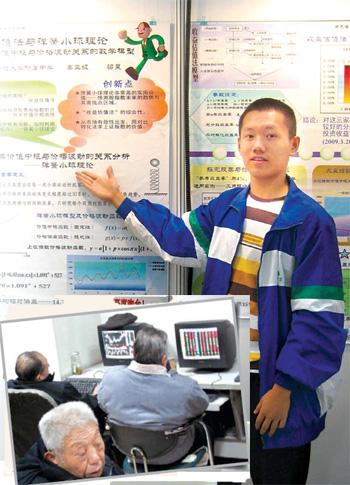
Above, Liang Hao stands in front of a board detailing his successful investment strategy. Younger people are said to make smarter and more rational investors than the older generation (inset). [File photo]
When it comes to stock trading, age does not necessarily equal wisdom.
At just 18 years old, Liang Hao has outperformed many institutional investors and private equity funds by making a nearly 100 percent profit from the stock market last year.
Over the years the high school student from Guangzhou, the capital of Guangdong province, has turned 70,000 yuan ($10,253.26) into several hundred thousand with his wily deal making. And he's cunning enough not to specify exactly how much he has made.
Liang, a believer in Warren Buffett's concept of fundamental analysis, is now primarily focusing on value investment and low-risk arbitrage trading to take advantage of price differences between the mainland and the Hong Kong market.
The youngster said one of his recent successful deals was an A+H arbitrage transaction where he bought the stock of China Shenghua Energy Co Ltd on the mainland's A-share market while purchasing a callable bear contract of China Coal Energy Co Ltd in the Hong Kong market to hedge risks. He said he made a 20 percent gain in profit from the trading in less than a month.
"I prefer low-risk arbitrage trading because the key to investment is not to make a lot of money but to preserve one's asset first," said Liang. "A clear mindset and proper investment concept and a habit that fits one's personality are what I think matters the most in stock trading."
Very few high school teenagers are thought to be investing in China's stock market, but Liang may represent a rising group of young, new investors in the country that are becoming more rational and are armed with well-cultivated independent thinking and analysis skills. They are in distinct contrast with the conventional view of small investors who view the stock market like a casino capable of churning out a quick profit.
A recent survey of Chinese retail investors by Beijing-based finance web portal Horise.com showed that Chinese investors are becoming younger than before. About 64 percent of investors surveyed were between the ages of 25 and 44. Those under the age of 25 accounted for 4.8 percent.
Chinese traders are also becoming increasingly sophisticated with 60 percent saying that their investment aim is to gain higher yields than bank interest rates offer. Only 30 percent said they want to make quick money from the stock market, according to the survey.
"Generally speaking, as the Chinese stock market keeps growing in terms of size, corporate governance and the legal environment, Chinese investors are getting more mature in their understanding of it," said Xin Yu, chief analyst with Beijing-based Aviation Securities.
"The younger generation of investors are able to play in a smarter and more rational way because they have higher education, better learning capabilities and an international perspective compared with the older generation."
Liang first dealt in the stock market at the tender age of 14 when the market slumped sharply in 2004. His father, who runs a steel trading company in Guangzhou, was his first investing mentor. Liang's initial capital was the 70,000-yuan "lucky money" - cash that children receive from parents as a Chinese New Year gift - that he had saved over the years.
It did not take long for the young trader to turn from an investing novice who didn't even know how to read candlestick charts into a sharp investor who started to make profits his father could not even match.
Liang said the proudest investment he made was an operation involving Ping An Insurance's stock in 2007. He successfully subscribed to 1,000 shares at the initial public offering at the price of 33.8 yuan. "I eventually sold them for 123 yuan and pocketed a good profit," he said.
The youngster is even critical of his father's investment methods. "His portfolio is a total mess," he said. "Twenty percent of his seven-figure assets are still trapped. His problem is that he won't cut his losses by selling the shares if the price does not rise back and this only causes him to lose more money."
The year 2008 was a tough year for most Chinese investors. The benchmark Shanghai Composite Index fell to 1,664 from a highpoint of 6,124 in 2007. It slumped more than 65 percent in 2008 with the market value decreasing by 17.2 trillion yuan.
Liang, like many investors, learned a hard lesson in the bear market of 2008. His investment in Citic Securities and Shanxi Xinghuacun Fen Wine Factory Co Ltd resulted in heavy losses and he eventually cut his entire holding at a low price.
"It was an unforgettable experience for me. I realized that value investment is not just about analysis of price/earning ratios and a company's fundamentals," he said. "The ability to constantly correct mistakes is also important."

The growth in China's stock market is not just about the upgrade of tools but also investors' techniques and mentality. [China Daily]
As China's capital market continues to improve, Chinese investors are becoming more sophisticated in stock trading. Investing in the stock market has also become an increasingly important way for Chinese people to manage their assets.
About 61 percent of retail investors made profits in 2009 while 6.2 percent profited more than 100 percent, the survey by Horise.com showed. Nearly 63 percent of investors said they would do research and analysis of a listed company before buying stock.
But the future could be more challenging to individual investors after the regulator earlier this month approved margin trading and stock-index futures, making trading in the Chinese market an even more sophisticated game.
"The long-term trend of the market would be more stable but short-term volatility will likely be much higher with two-way trading activities," said Xin Yu of Aviation Securities.
"Therefore, it requires pretty skilful trading techniques and a healthy psychological status for retail investors to ride the long-term growth of the market. But if you are too hasty and over trade, it's very easy to get your fingers burnt."
Zhang Jianli, a 64-year-old investor from Beijing, has played the stock market for 14 years. He once lost his entire assets but did manage to survive.
"Whether you are from the school of technical analysis or fundamental analysis, you have to keep in mind that the market is always right and investors are those who make mistakes," Zhang said. "So never fight the market. One needs to be flexible in order to survive."
For some investors, the market is a place where only hardworking investors can survive.
"Losers are lazy people in the market. To survive in the market, one has to be a hard-learning investor," said Li Xin, a 34-year-old stock trader in Beijing. Li said he often spent about three hours a day studying price charts, patterns and indicators of the market to help him make the right decisions.
After the sharp fluctuation of the past few years, Chinese investors experienced the worst of the market and are expecting another bull trend to come. But Liang remains cautious for the A-share market in 2010.
"Uncertainties still exist in the market and the PE ratios of many stocks are too high," he said. "It is possible that China's fast recovery from the financial crisis will lead to a new round of inflation."
But the high school teenager said his passion for the financial market would continue to grow. He has decided to major in finance at college and gain some work experience in investment banks after graduating. Liang said his ultimate goal is to run his own fund management company in the future like Buffett's Berkshire Hathaway.
"My passion for the financial market is a natural and innate thing. It's like Pavarotti loved singing and Bill Gates loves computers," he said. "The interesting relationship between time and capital always fascinates me."





